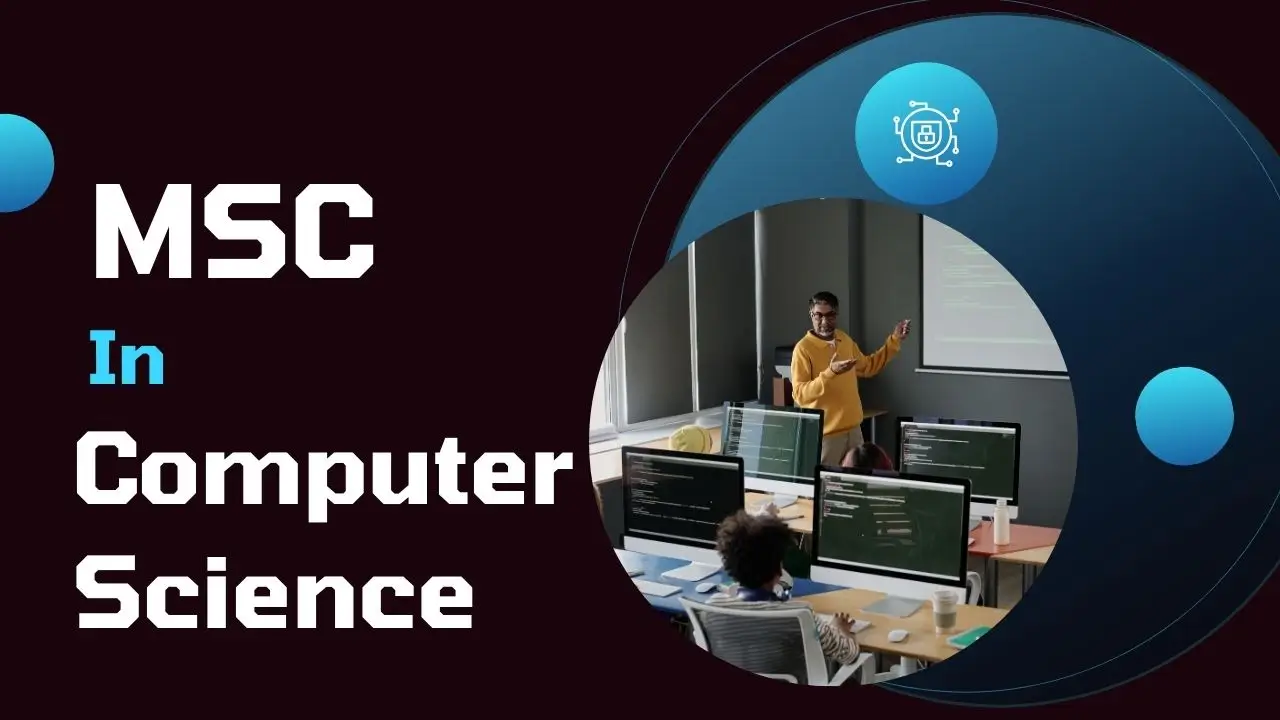MSc in Computer Science: Guide for Tech Professionals
If you have a strong interest in technology and want to advance your understanding of computer science, earning an MSc in computer science can be the ideal course of action.
Your technical abilities will improve with this advanced degree, which also provides access to lucrative careers in fields such as cybersecurity, data science, artificial intelligence, and software development.
We’ll go over the contents of an MSc in Computer Science, its advantages, prerequisites for admission, potential career paths, and why it’s worthwhile in the tech-driven world of today in this extensive guide.
MSc in Computer Science Overview
| Parameters | Course Details |
| MSc Computer Science Course Level | Post Graduate |
| MSc Computer Science Course Duration | 2-Year |
| Minimum Percentage Required | 50% |
| MSc Computer Science Admission Procedure | Merit and Entrance Based |
| Top Entrance Exams | CUET PG, IIT JAM, BITSAT, NEST |
| Examination Type | Semester or Yearly wise |
| Subjects Required | Physics, Mathematics, Computer Science |
| MSc Computer Science Entrance Exams | IIT JAM, CPGET, AP PGCET, CUET-PG, MAH CET, etc. |
| MSc Computer Science Fees | Between INR 1 Lakh and 33.85 Lakh |
| MSc Computer Science Salary in India | INR 6.4 LPA |
What is MSc Computer Science?
M.Sc. in computer science is a career-oriented education for computer lovers. This course appeals to students with bachelor’s degrees in computer science, computer applications, and other fields. The ongoing and amazing expansion in the digital front has increased the popularity of numerous technological courses.
The education sector is very interested in computer science. M.Sc. Computer Science, often known as Master of Science in Computing, can be a two-year postgraduate degree. The M.Sc. in Computing is designed to provide you with the knowledge and skills needed to create new solutions for the modern computer industry.
Since computer science is one of the most popular disciplines for Master of Science degrees, many institutions offer the M.Sc. computing program in both conventional and remote learning formats.
Why Study MSc Computer Science?
In recent years, the variety of computing applications and their significance to our daily lives have grown significantly. Artificial life has advanced significantly in several domains, including robotics, computer vision, mobile devices, and game applications, all of which are now commonplace in human interactions with computers.
MS in Computer Science Fees in USA
The cost of an MS in computer science for Indian students in the United States may vary depending on the university and institution. When applying for admission, students are advised to thoroughly examine both the tuition and living expenses.
This will help you sort the universities according to your financial constraints. The average annual cost of living might be close to INR 8 lakh, whereas the average first-year cost of studying MS Computer Science in the US is INR 18–25 lakh. A student’s choice of housing, personal expenses, leisure trips, etc., are all factors that impact their living expenses.
Student Visa Costs for the US
F1 Visa: International students who want to study in the US can apply for this student visa. Form I-20, Certificate of Eligibility for Non-Immigrant Student Status, is required to receive an F1 visa. The student fee for an F1 visa is $185. Depending on your home country and the US Embassy you visit to fill out the paperwork, additional costs may be needed.
J-1 Visa: International students who wish to take part in exchange programs in the United States must have a J-1 visa, J student visa, or exchange guest visa.
Eligibility Criteria
- Passport photocopies.
- An undergraduate or bachelor’s degree with a 3.0 overall GPA out of 4.0.
- GRE score in the range of 290–330. Depending on the university, different scores can be needed.
- results of the TOEFL (Band of 7 to 7.5) or IELTS (6.5 to 7 Band) tests of English language competence.
- A certificate or verification of internship or employment experience. Check out: American Part-Time Jobs
MSc Computer Science Syllabus 2025
| MSc Computer Science subjects Semester I | |
| Principles of Programming Languages | Advanced DBMS |
| Information Systems & Software Engineering | Discrete Mathematics & Numerical Methods |
| Corporate Culture & Communication | Advanced DBMS Lab |
| Programming Lab | Computer Networks |
| MSc Computer Science subjects Semester II | |
| Object-Oriented Analysis & Design | Data Structure and Analysis of Algorithm |
| Advanced Computer Architecture | Data Communication & Networking |
| Object Oriented Programming Lab (using Java) | Data Structure Lab |
| Microprocessor and VHDL/Verilog Lab | Cyber Security |
| MSc Computer Science subjects Semester III | |
| Operation Research | Advanced Operating System |
| Artificial Intelligence | Elective – 1 |
| OR Lab | OS Lab (Unix) |
| Seminar | Industrial Training |
| MSc Computer Science subjects Semester IV | |
| Elective – 2 | Elective – 3 |
| Elective – 3 (Lab) | Viva Voce |
Admission Process
Online Procedure:
- Gather your papers and prepare soft copies of them.
- Go to the university’s or institute’s official website.
- Using the information on your documents, complete the entrance application form.
- Make sure your papers and the details on the form correspond.
- Attach the soft copies of the needed papers.
- Sign the document and send it in.
- Online payment is required for admittance.
Offline Procedure:
- Have copies of your documents that have been self-attested on hand.
- Visit the official website or pick up the admission form at the admission desk.
- Use a pen to complete the entrance application form, or use the internet if it is accessible.
- Be careful to double-check the information from the current paperwork.
- Your admission form should have copies of the originals attached.
- At the counter, sign the paperwork and turn it in.
- Make the necessary payments.
Conclusion
Anyone hoping to succeed in today’s tech-driven environment would be well to get an MSc in computer science. This postgraduate degree gives students in-depth knowledge and practical skills, opening doors to high-paying positions in industries including software development, cybersecurity, and artificial intelligence. It offers a wide selection of specializations and good career prospects.






